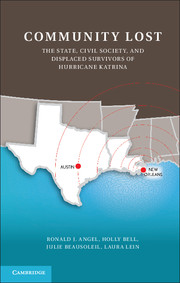Book contents
- Frontmatter
- Contents
- Acknowledgments
- Introduction
- 1 After the Storm
- 2 An Emerging Methodology for a Crisis Situation
- 3 Life before the Storm
- 4 Evacuation and Arrival in Austin
- 5 The Limited Transportability of Social Capital
- 6 Civil Society, NGOs, and the Grassroots Response
- 7 Housing, Employment, and Identification
- 8 Health Care and the Limitations of Civil Society
- 9 The State, Civil Society, and the Limitations of Social Capital
- Bibliography
- Index
8 - Health Care and the Limitations of Civil Society
Published online by Cambridge University Press: 05 June 2012
- Frontmatter
- Contents
- Acknowledgments
- Introduction
- 1 After the Storm
- 2 An Emerging Methodology for a Crisis Situation
- 3 Life before the Storm
- 4 Evacuation and Arrival in Austin
- 5 The Limited Transportability of Social Capital
- 6 Civil Society, NGOs, and the Grassroots Response
- 7 Housing, Employment, and Identification
- 8 Health Care and the Limitations of Civil Society
- 9 The State, Civil Society, and the Limitations of Social Capital
- Bibliography
- Index
Summary
CASE STUDY: FALLING THROUGH THE CRACKS
Just before the storm, John Washington, a fifty-five-year-old HIV-positive African American male, had moved into a subsidized apartment in a complex for elderly and handicapped individuals in New Orleans. Getting the new apartment was a major achievement and, John hoped, the end of his homelessness. Before moving into his new apartment John had been living at a shelter. It was there that he received assistance in applying to the housing voucher program that finally enabled him to get his own place. Prior to that, he had at times been homeless and often slept in the streets. Just before Katrina struck, he had also begun receiving social security disability payments. Unfortunately, John’s newly independent living arrangements were short-lived.
The residents of the apartment complex were old and disabled and thus most suffered greatly as a result of the storm and its aftermath. According to John one resident died during the storm. Because of his illness, John also had a difficult time. He had recently been hospitalized and had been taking medications for several HIV-related health problems. The storm disrupted his medication regimen, and when he was evacuated, he left without his medicines. As he told us, “…I was on…[inaudible] and Bactrim ’cause I have pneumonia…and some other kind of medicine, but I can’t think of the name of it….I don’t know the…name of the medicine.” We interviewed John only once within a few days of his arrival at the Austin Convention Center, where he should have immediately been placed in contact with HIV services. We do not know why he was not. Perhaps he did not inform the Red Cross or others of his condition. In any case, he was not taking his regular medications and was confused about how to get help. He told us that he “…[didn’t] know how to get [my medicines] ’cause I [came] with [only] the clothes on my back…the only way I [knew] how to get [my medicines]…is if I call…[the medical center in New Orleans]….I don’t know if they reopened or not.”
- Type
- Chapter
- Information
- Community LostThe State, Civil Society, and Displaced Survivors of Hurricane Katrina, pp. 172 - 191Publisher: Cambridge University PressPrint publication year: 2012



